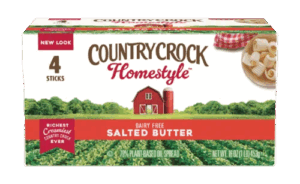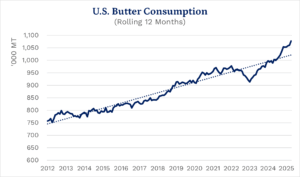 By Christopher Galen, Executive Director, American Butter Institute
By Christopher Galen, Executive Director, American Butter Institute
Butter continues to be the case study for how real dairy products have been dogged by plant-derived imitators for decades. Where butter is concerned, oleomargarine has been nipping at its heels for nearly 100 years, starting at the dawn of the ultra-processed food era. Margarine use surged after World War II, but in the 21st century, a preference for natural foods and consumer aversion to long ingredient labels has turned the tide, as per capita butter use has grown, while vegetable spreads usage has melted.
But there’s always a new wrinkle to this competition, or, to mix metaphors, old wine in new skins. I’m referring to the Country Crock product made from seed oils (palm and canola, mostly) that doesn’t even meet the legal definition of margarine. Yet its makers have the gall to market this as “dairy free salted butter.” In addition to that highly suspect prominent label description, the Country Crock package includes an image of a traditional red barn associated with dairy farms and employs an image of real butter pats, not their oily impersonators.
This label is a flagrant violation of federal standards of identity, which define butter as a product “made exclusively from milk or cream, or both, with or without common salt, and containing not less than 80% by weight of milkfat.” That’s the clear description of the Code of Federal Regulations, and Congress even passed a Butter Act to further emphasize the point that plant-based imitators don’t fit the butter bill.

This misleading packaging prompted the American Butter Institute (ABI) to fire off a letter this summer to the FDA’s Office of Nutrition and Food Labeling, pressing the agency to either ask Country Crock to correct its label or seek its withdrawal from sale, given its false and misleading label.
Unfortunately, while the FDA was quick to respond to ABI’s complaint, the gist of its response was that it is relying on plant food marketers to police their own practices according to a 2025 FDA guidance indicating that if imitators use the name of a standardized food (butter, in this case), the imitation food should be qualified by its type of plant source. The FDA also wrote to ABI that it looks at the entire context of the label to identify the nature of the food within, to ensure that it is not misleading.
Thus, what’s particularly irritating here is that the label is obviously designed to deceive: apart from the oxymoron of “dairy free salted butter,” it also features a big red barn and silo on its front, while offering only in a very tiny font at the package bottom that it is a “79% plant-based oil spread.” If there is a better illustration of a false and misleading product package, you’d have to search the grocery store for a long time to find one.
I wish I were surprised by this shrug of the shoulders by FDA, but that’s been the consistent pattern for many years regarding things like vegan butter and plant-based butter . . . along with the whole panoply of fake milks, cheeses, ice creams, and yogurts, none of which have a drop of real dairy in them.
So, ABI and the National Milk Producers Federation will continue hammering away at the FDA regulators and ask them to simply do their jobs. We are hoping that the new leadership at FDA will feel compelled to defend food product integrity and help consumers make better choices about real foods — a process that has to start with the label.
This column originally appeared in Hoard’s Dairyman Intel on July 31, 2025.






